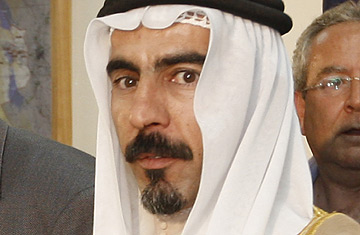
Abdul-Sattar Abu Risha, leader of the Anbar Salvation Council, is pictured during a meeting in Anbar province, Iraq.
When Sheik Abdul Sattar Abu Risha was assassinated Sept. 13 the culprits and the motive seemed clear. Sheik Sattar was leading the effort to rally Sunni tribes in Anbar Province to turn on the jihadists in their midst. Al-Qaeda in Iraq (AQI) claimed responsibility for the killing, and jihadists gloated on their online message boards.
But, in a turn of events that underscores just how complicated the fight in Anbar remains, on Friday an Iraqi police official said that one of the men arrested as part of the assassination plot was the head of Sheik Sattar's security detail. Reports from the Iraqi Security Forces have to be taken with a grain of salt, but if the story is true, then AQI offered the security chief $1.5 million to set up his boss.
One of the things that appealed to the Americans who work with these Sunni groups was their apparent incorruptibility. Unlike the unreliable and incompetent members of the largely Shi'ite Iraqi Army and police, Sunni tribes and nationalist insurgents seem thoroughly committed to a goal that resonates with Americans: keeping their families and their communities safe.
But what appears to be the betrayal of Sheik Sattar shows the dangers of romanticizing any of Iraq's various factions. The tribes did not turn on AQI for entirely admirable reasons. They turned, in part, to protect their own interests — the power they wielded and the wealth that their power entailed. If the situation changes or sufficient inducements are offered, some of them will no doubt switch sides again.
One of the reasons Sunni tribes and ex-insurgents are so good at capturing and killing jihadists is that they used to work with them. They know who the jihadists are, and know where to look for them. But this former closeness cuts both ways. If indeed AQI enlisted Sattar's security chief in the assassination plot, it would have had to know beforehand where to find him and how to contact him. And if they had $1.5 million to pay him, they may have more money to pay others to change sides.
